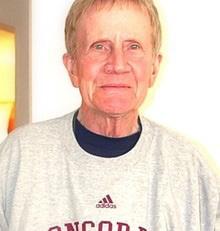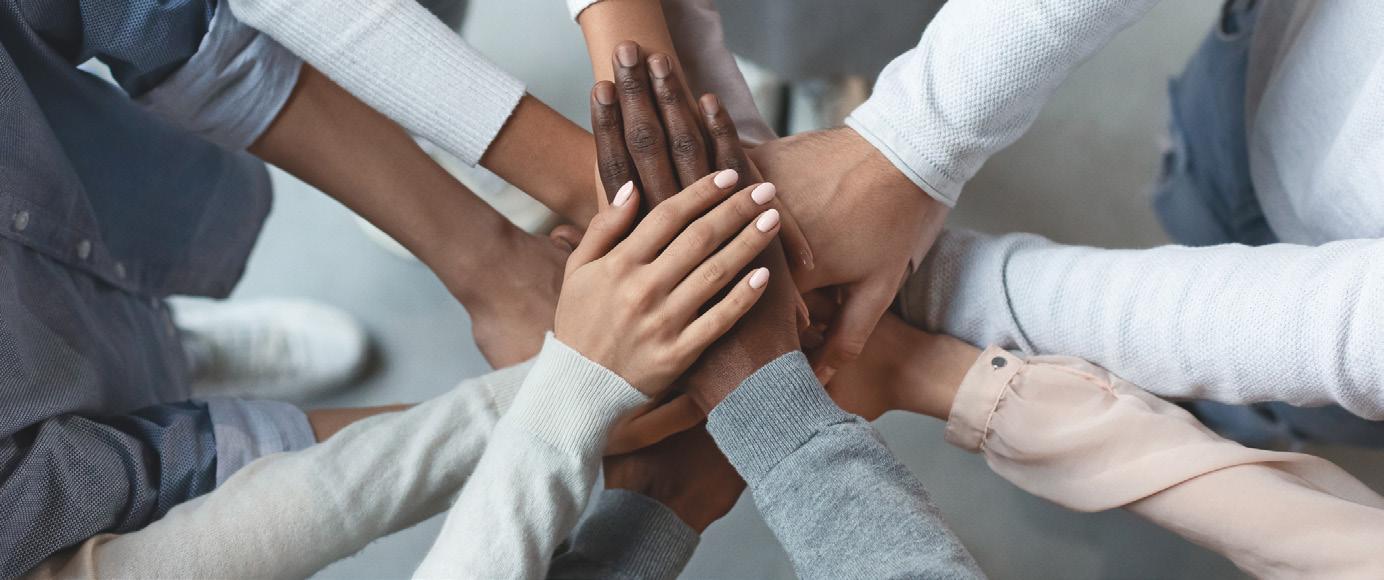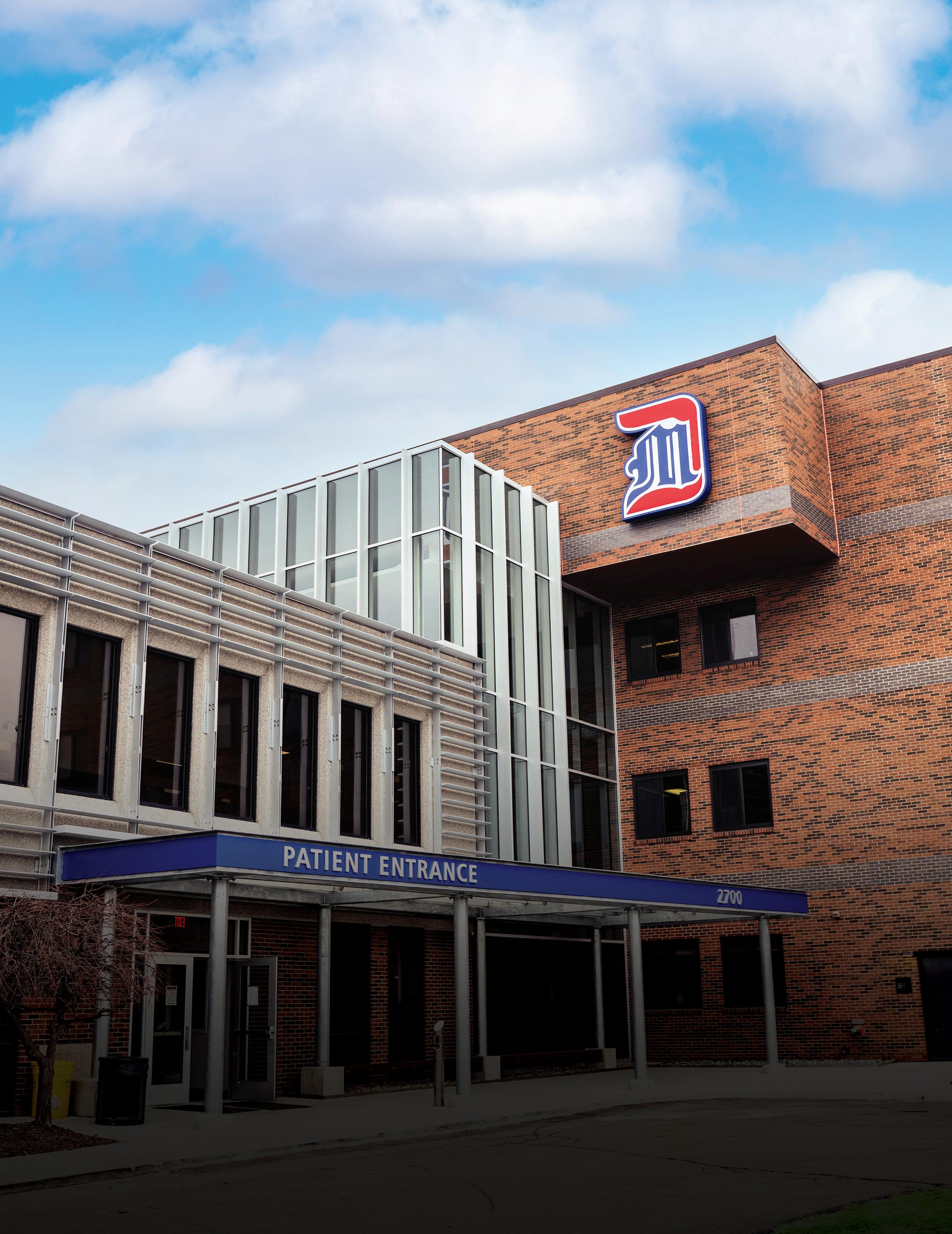
17 minute read
Featured Article - Emerging Better
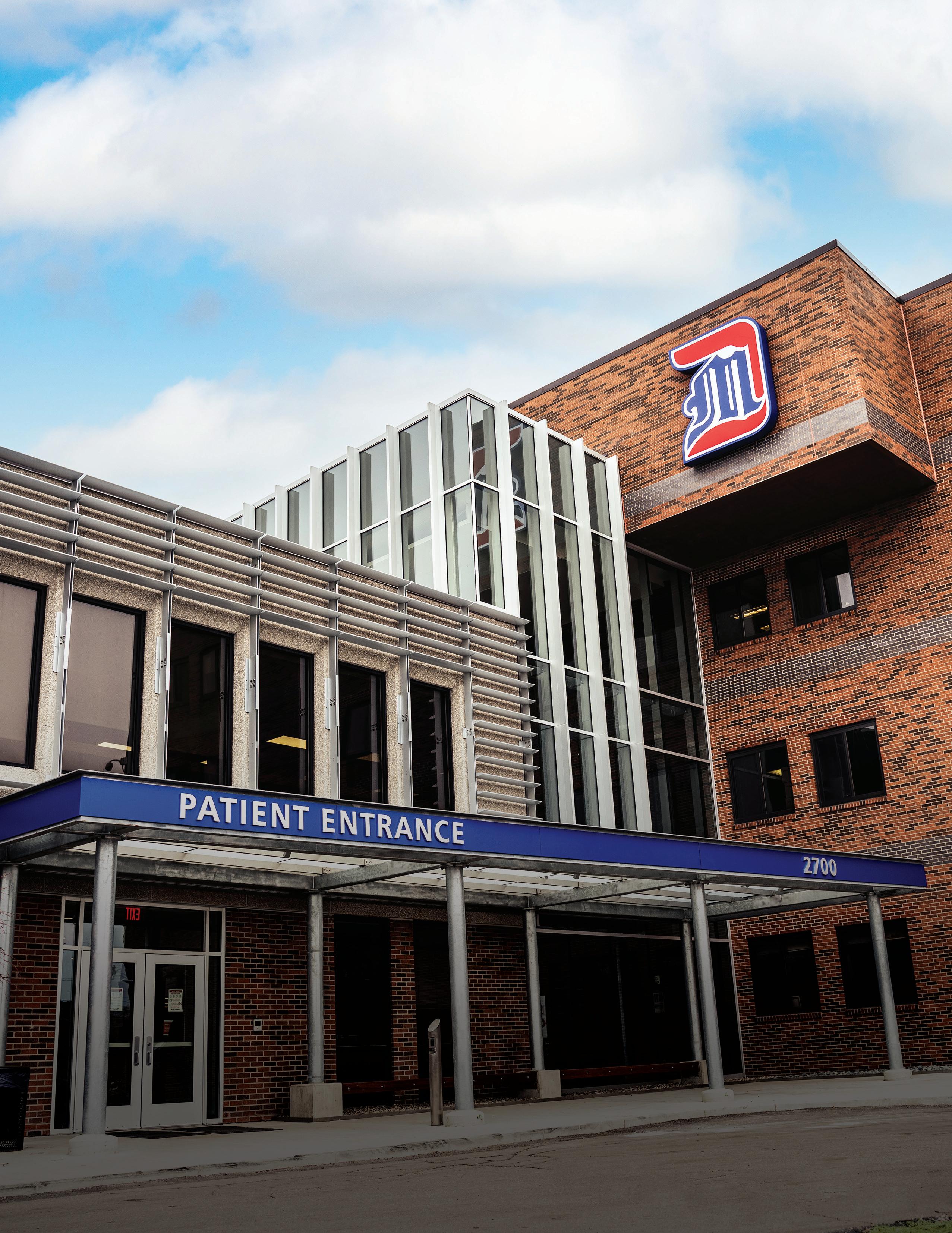
Lessons learned make for a brighter future for tomorrow's oral health professionals
Advertisement
By Rhonda Evans, B.F.A.
COVID-19 has brought experiences and challenges that no one could have predicted. While the memory of large family gatherings, social parties and dining at your favorite restaurant is slowly fading, the new normal of masks, sanitizing and social distancing has become all too familiar.
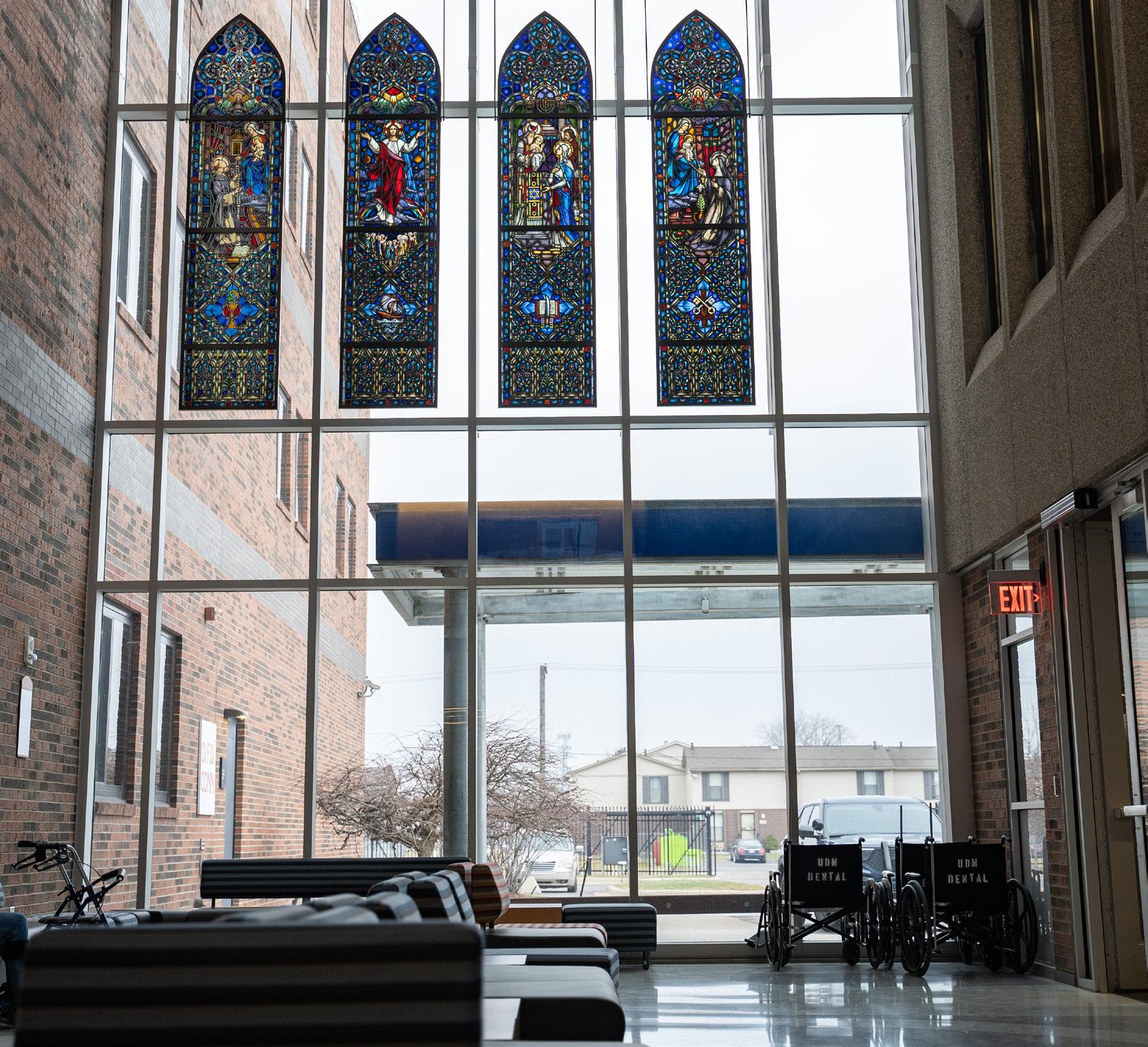
While researchers and scientists worked continuously to provide the world with promising vaccines, the impact of COVID-19 has changed the world as we know it. Employees everywhere are now categorized as “essential” or “non-essential” workers, some have had to adjust to working remotely, and students have transformed their homes into virtual learning environments.
Although so much has changed, the importance of healthcare has never been more apparent and oral health is a part of that. Among the highest at-risk occupations, oral healthcare professionals continue to be on the front lines caring for patients. The surge of demand for personal protective equipment (PPE) has made clinicians more conscious of infection control and has built a higher dental hygiene and oral health consciousness among the general patient population. JUMPING INTO ACTION
Academic institutions across the globe transitioned from in-person to online learning, seemingly overnight. Universities, in particular, faced unique challenges as the number of young adults (18-35) infected with COVID-19 surged across the United States. Dental students were in an especially difficult position as they require in-person learning activities and hands-on patient care experiences that produce aerosols, increasing their risk of contracting respiratory borne COVID-19.
While honoring the educational commitment to our students, Detroit Mercy Dental remained dedicated to keeping the health and safety of its patients, students, faculty, residents and staff as our number one priority. The School quickly developed, created, and enhanced safety protocols and infection-control procedures. “We have limited the number of people allowed on campus grounds at one time. Students are now taking their didactic courses virtually, reducing the closeness of usual colleges and universities,” said Professor and Interim Director of Biomedical Sciences David Fischer. “Faculty are delivering lectures via Blackboard or Zoom, and exams are taken online with virtual proctoring.”
Detroit Mercy Dental adheres to the Centers for Disease Control and Prevention (CDC) guidelines, state of Michigan regulations and the recommendations of the American Dental Association (ADA). All who enter the building are subject to
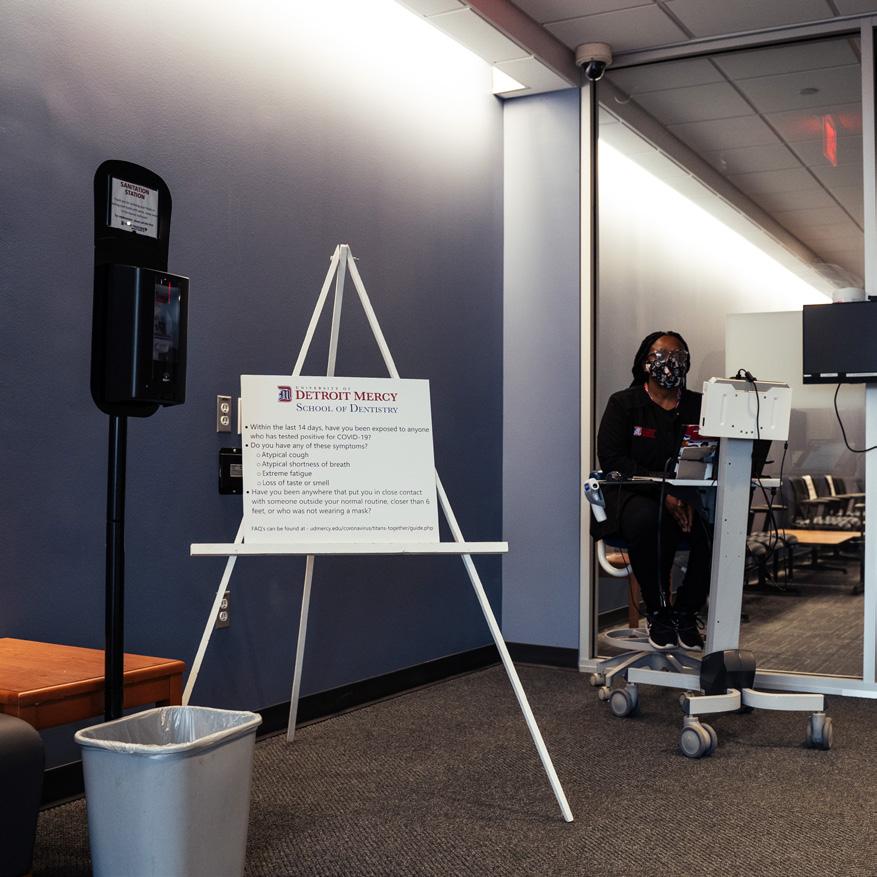
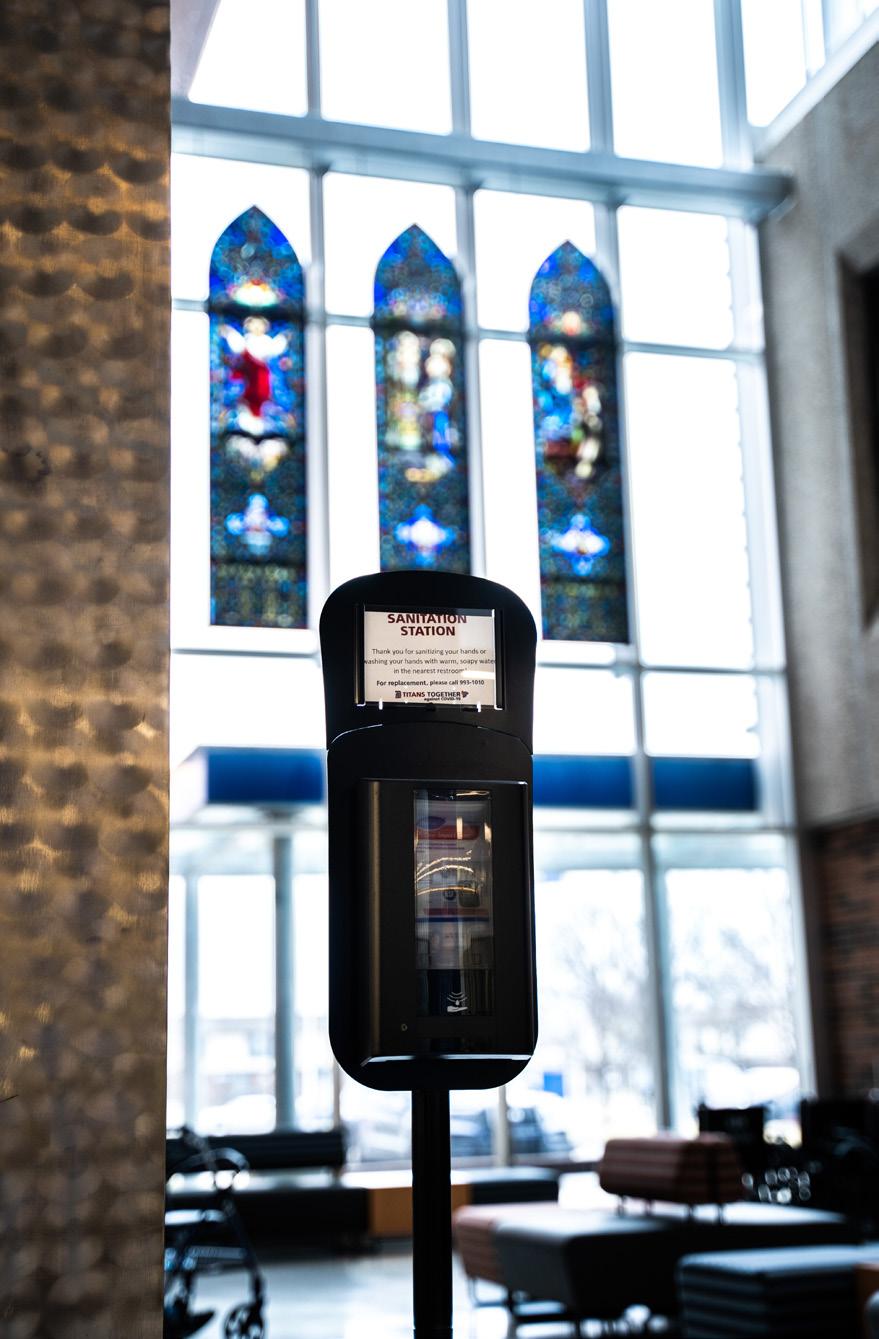
SAFETY ACTIONS TIMELINE
MARCH - JUNE 2020 “Stay Home, Stay Safe” executive order closes campus.
MARCH 2020 - PRESENT Didactic courses transition from in-person lectures to synchronous or asynchronous lectures delivered via Blackboard Collaborate.
Reconfigure academic calendars for each class to make up for lost time and ensure graduation dates remain as close to the originally scheduled dates as possible, while maintaining educational quality.
MAY 2020 - PRESENT Establish screening, isolation and quarantine procedures to limit the potential for COVID-19 spread on campus.
Adapt the Corktown Campus to meet social distancing requirements while restarting patient care.
Adapt Corktown Campus to meet social distancing requirements while restarting pre-clinical simulation lab activities.
JUNE - JULY 2020 Graduating students and award winners honored on their originally scheduled graduation date.
AUGUST 2020 - PRESENT
Virtual/Distanced Orientation Virtual Interviews for the Dental Class of 2025.
NOVEMBER 2020
Began sending weekly email reports to campus regarding new cases, active cases and quarantines for exposure/testing.
Institute travel and activity screening for the Thanksgiving and Christmas holiday break a CDC screening, required to wear a mask and must maintain a proper social distance. To minimize the spread of potentially harmful aerosols, clinics have undergone several modifications, including the integration of an aerosol mitigating system (AeMS) on all patient chairs, central air purification, protective partitions, a thermal scanner and marked walking patterns. In addition, to lower the number of persons on campus at one time, appointment times have been staggered as have operatory utilization and alternating blocks of instruction. Though clinics are operating at a 50 percent capacity, students have improved their efficiency and time management skills. “We have an incredibly driven group of students,” Fischer said. “They have a goal in mind and don’t want to do anything to jeopardize that. They want to get done on time.” remained online while both patient-based and simulation activities resumed on campus in June.
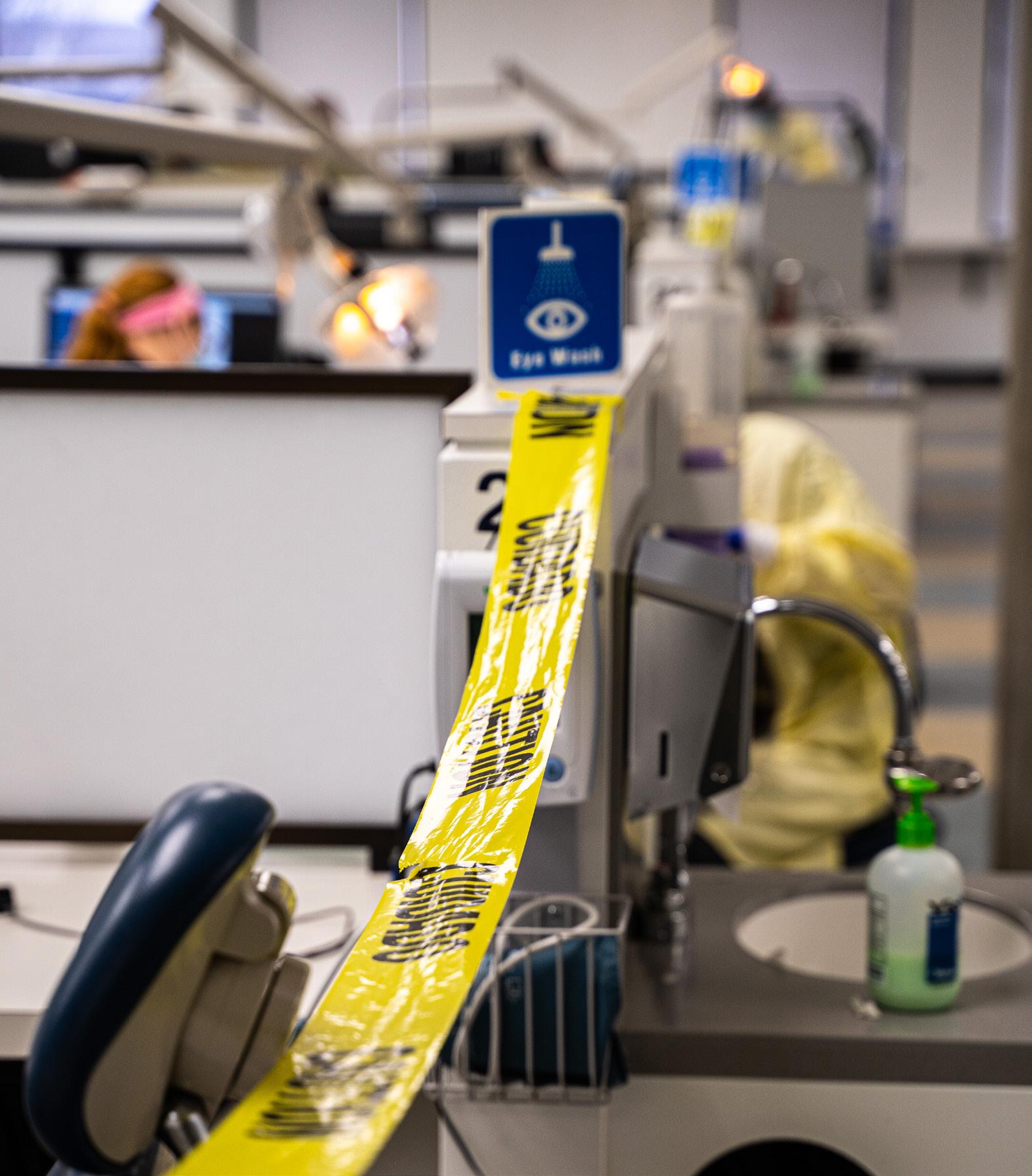
In the case that faculty, staff members or student contracts COVD-19, Detroit Mercy Dental has a contact tracing team in place so all those who may be at risk are notified. In addition, our faculty are always considering how best to treat our patients, both in an emergency and non-emergency capacity.
TEACHING AND LEARNING
While teaching and learning looks different than it has in years past, students continue to receive the same amount of didactic and practical experiences that Detroit Mercy Dental has built its reputation on. Class sizes for in-person activities have been reduced to groups of 36 and online courses are delivered in synchronous (real-time) and asynchronous (recorded) formats.
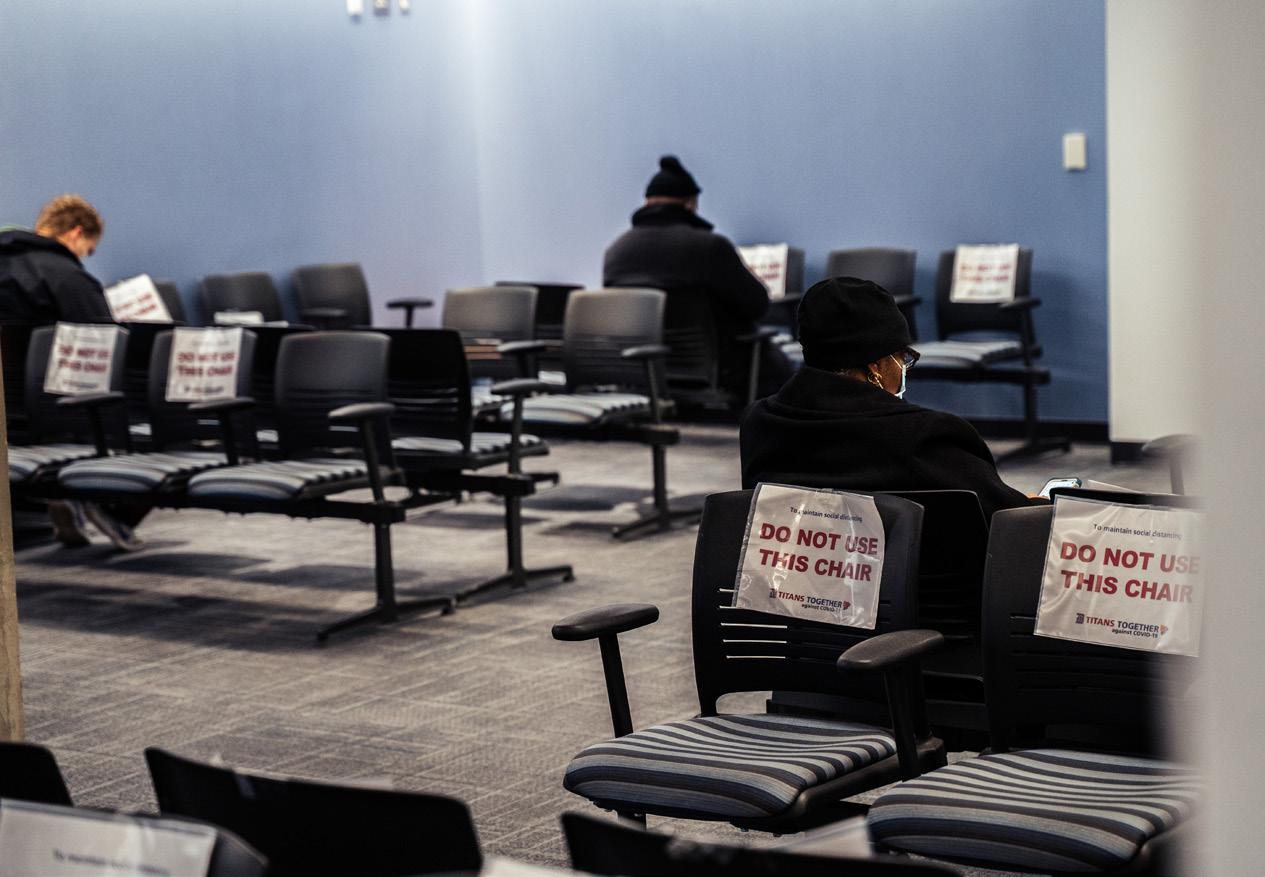

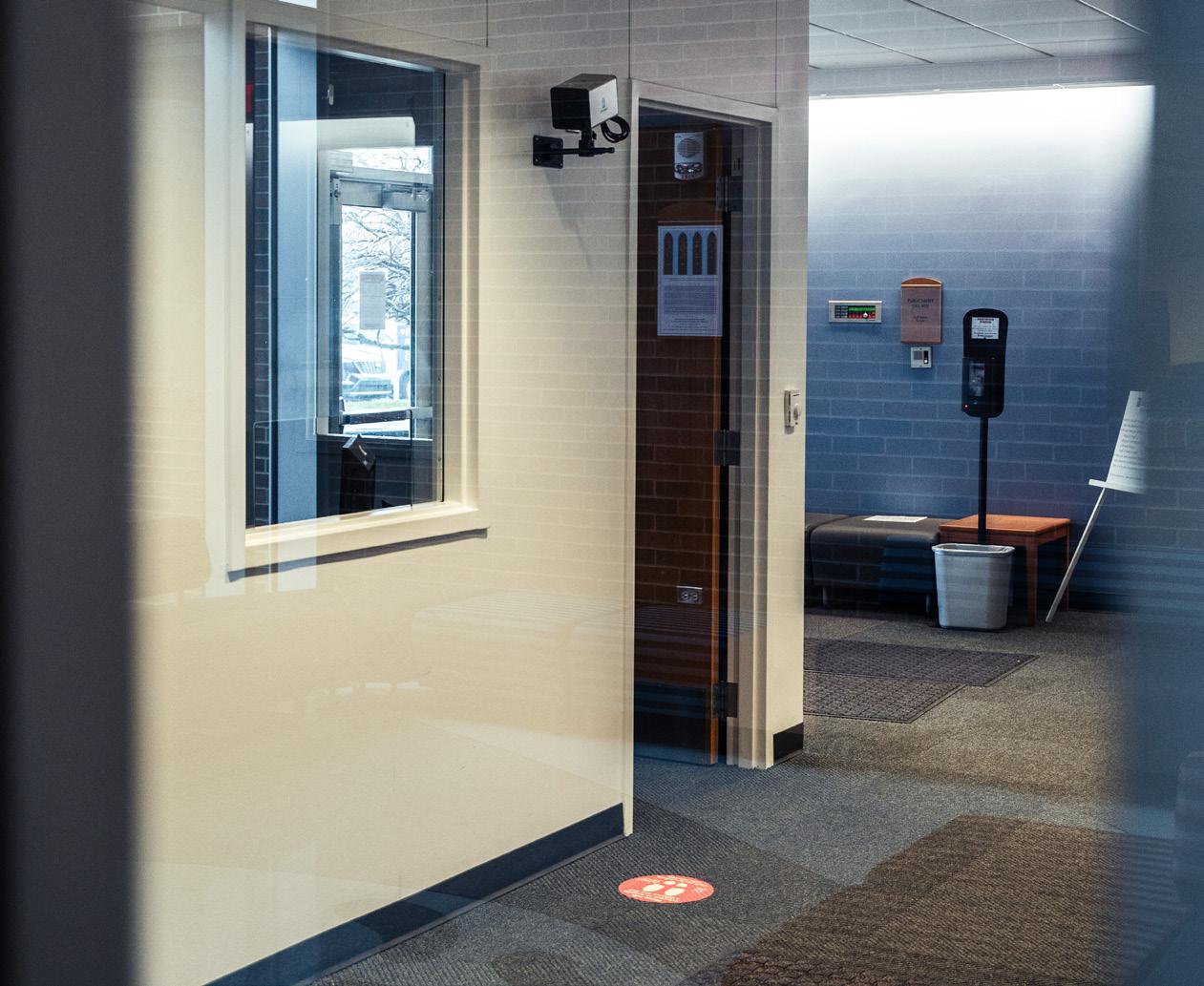

These smaller cohorts allow for more individualized instruction and have proven to be successful.
Despite the flexibility that distance-learning provides, the need for creative and innovative teaching methods continues to grow. Peer interaction and non-verbal feedback are irreplaceable and a vital component of educating compassionate and person-centered practitioners.
“Philosophically speaking, physical interaction allows for a kinesthetic learning environment that virtual learning isn't able to provide,” said Professor and Division Director of Clinical Essentials and Simulation Rafael Pacheco. “I can grasp how much a student is understanding through eye contact and even the vibrations of the frequencies that comes from their voice in the air.”
As the traditional “drill-and-fill” approach is taken over by minimally invasive dentistry, Pacheco says, “the future of the profession, and hence dental education, is moving toward conservative procedures that do not remove unnecessary sound structure, and minimizes the need for generating aerosol. An example of that is the ART technique (Atraumatic Restorative Treatment), which does not require electricity or any equipment, can prevent the progression of disease, and results in reduced pain and discomfort for the patient. Furthermore, regenerative dentistry is the future.”
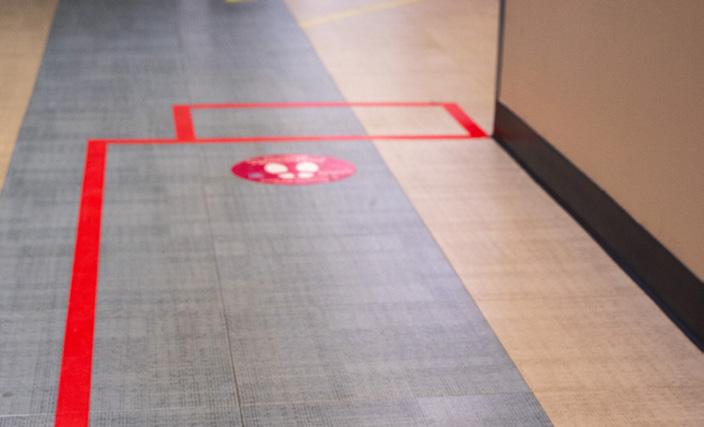
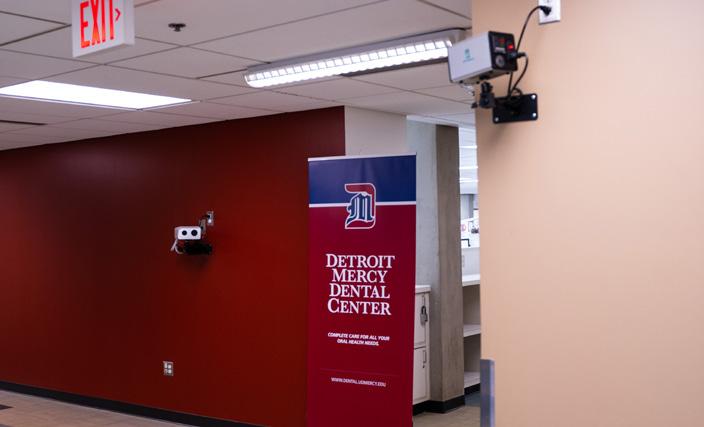
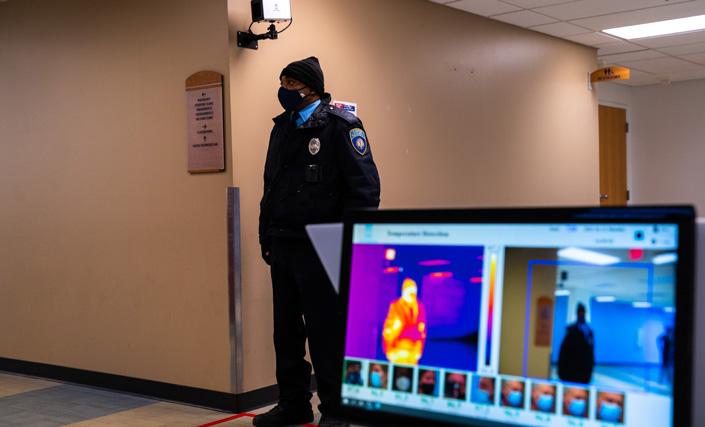

SUPPORT STAFF
Detroit Mercy Dental support staff are the epicenter of clinic operations and its necessary changes. Not only does staff help the everyday clinic operations run smoothly, but they also help to ensure stakeholder safety with increased cleaning measures, disinfection methods and armamentaria management.
We are in an environment that includes dental, medical and scientific research professionals who stay at the forefront of developments in their respective fields. Our internal experts keep the school community abreast of the latest updates and protocol changes.
Staff from the Corktown campus, Titans for Teeth Mobile Dental Clinic, Wayne Clinic and University Health Center (UHC) all work together to reduce the number of necessary trips to the dispensary. As well, some have lent themselves to different locations to ensure all precautions are being met for the safety of our students, faculty, residents and patients. They too have had to pivot and now have longer days, staggered schedules and modified job duties.
“The wonderful cooperation and flexibility required to accomplish all these changes, continues even now,” said Director of Clinical Patient Operations Mary Yim. “This positivity, of course, includes all staff, students, residents and faculty... we all have made huge changes that resulted in positive teamwork across-the-board. We are constantly improving upon systems and are dependent upon feedback from each other. We all play a part in our collective success by taking our roles seriously, keeping informed, maintaining social distance — whether on campus or off — and being cognizant of the proper use of PPEs, disinfecting wipes, barriers, and other protective measures.”
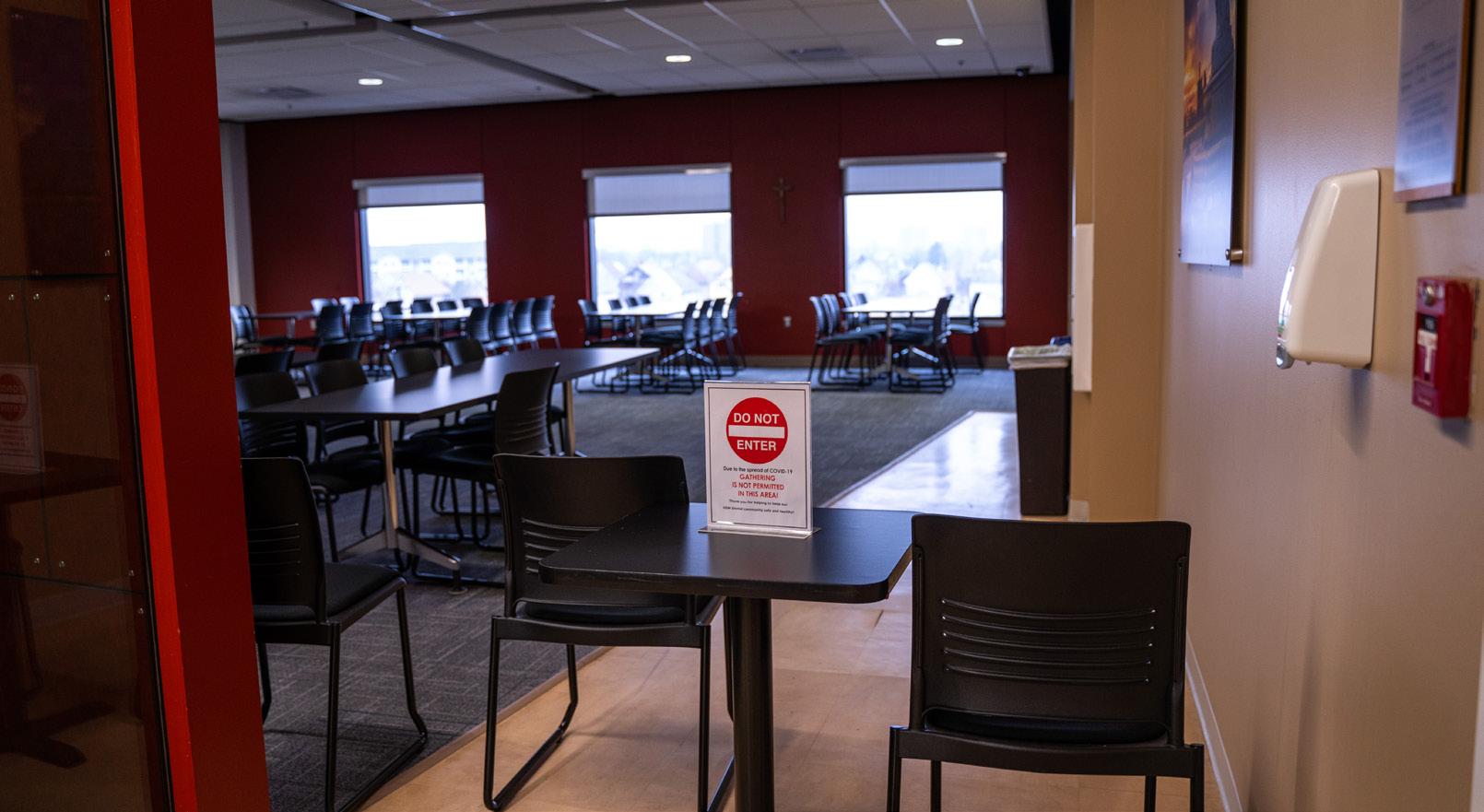
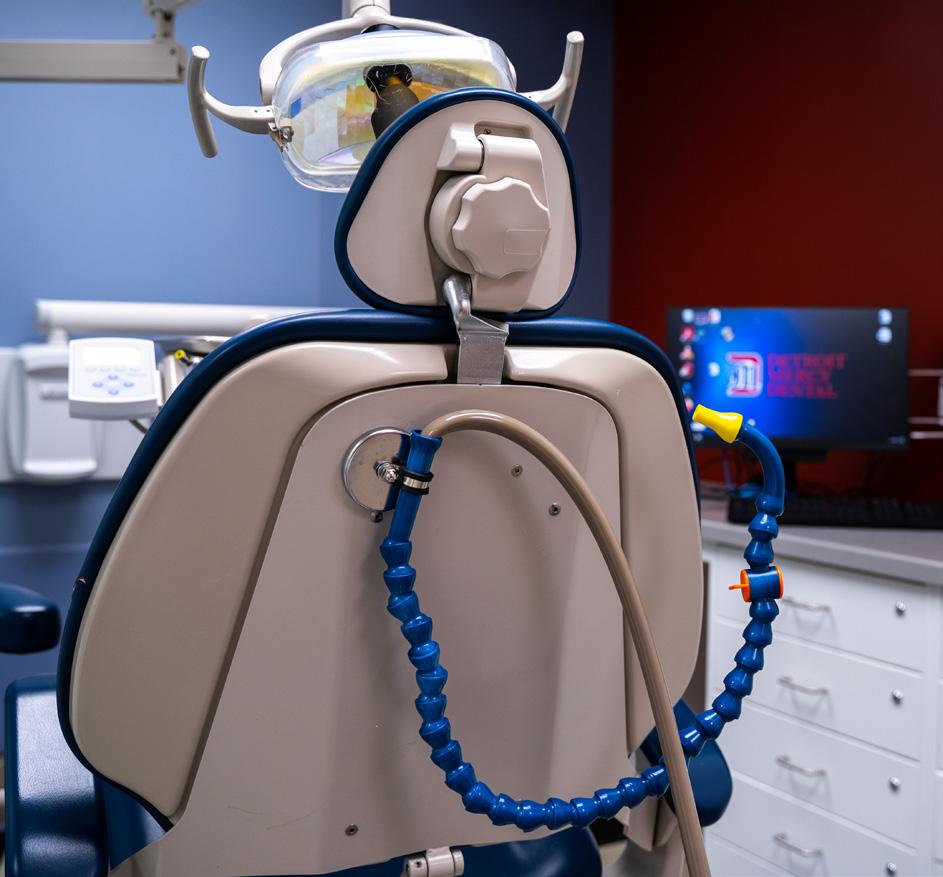
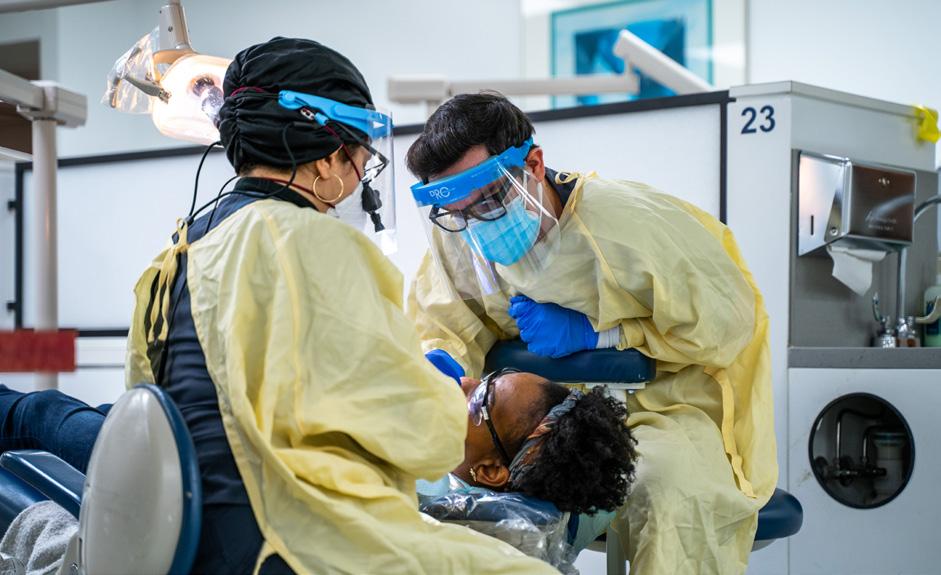
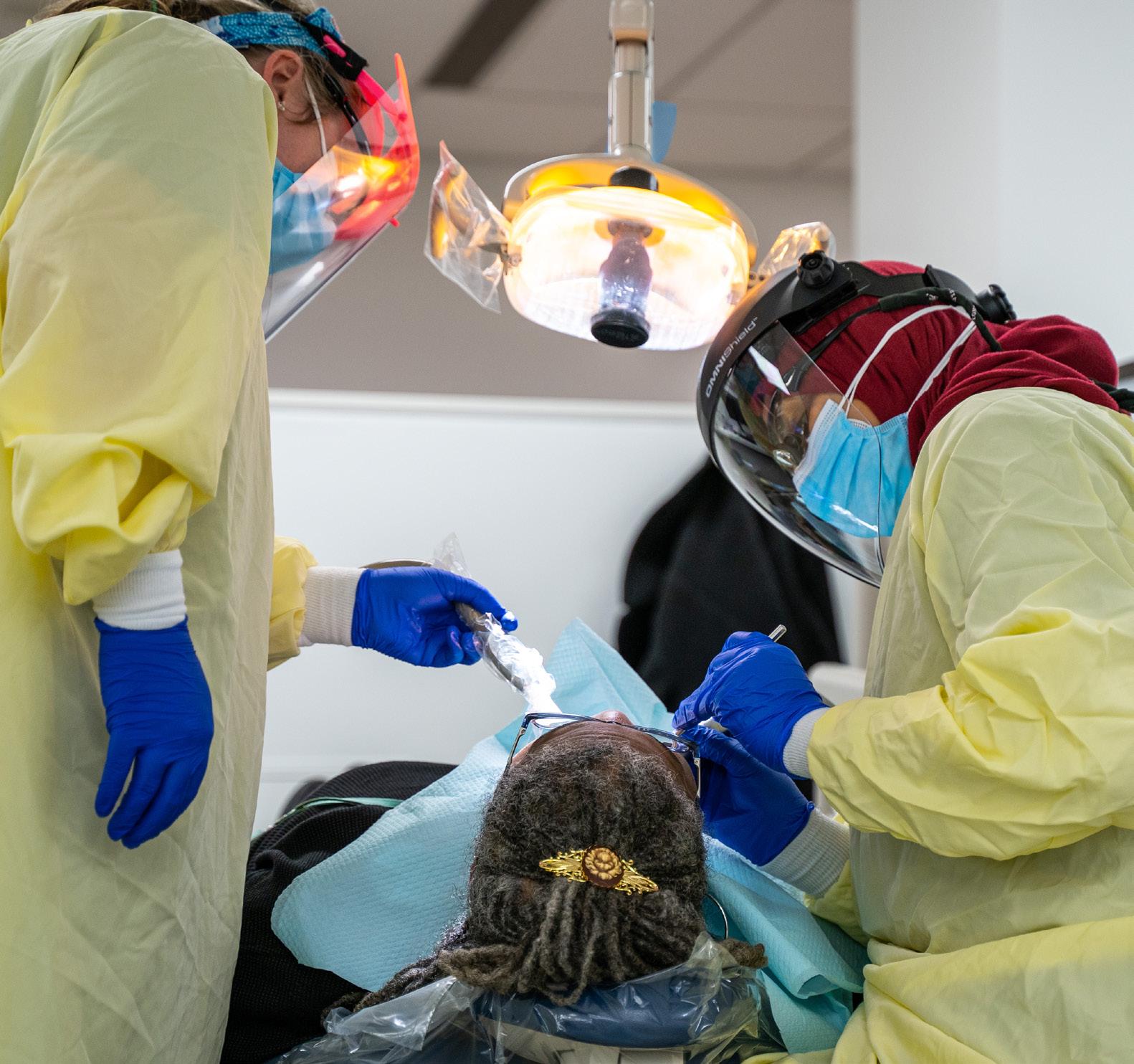
PATIENT CARE
The lack of access to dental care during the Michigan stay-at-home order has highlighted the need for dentistry as an essential service. Division of Advanced Education in General Dentistry (AEGD) Program Director Christina Van Dam and Assistant Program Director Rista Urukalo both testify to the various challenges residents and faculty have undergone due to the pandemic and how, in spite of much difficulty, the competent and motivated current class of residents has met all challenges head-on with much success. They said:
Our clinics have been integral in providing care to the community by being a dental home to so many patients, including those who have limited resources for care.
At the Detroit Mercy Dental Center, patient care is always our priority and, with the challenges brought about by the pandemic, our patients are now receiving a more concierge-type approach to care. Patients are pre-screened for symptoms and have their temperature taken when entering the building. There is less waiting with longer appointments and more dedicated provider time resulting in the need for fewer visits.
As a profession, we are much more aware of aerosol-generating procedures and the respective PPE needed for the adequate safety of our students, residents and faculty. As well, we remain mindful of the number of patients in the clinic at one time and the fallow time required prior to cleaning and disinfecting the patient operatory. Prior to COVID-19, residents would occasionally have multiple patients at one time and that is no longer manageable with nownecessary precautions.
Our patients have grown to expect meticulous attention to infection control when presenting for care. The new normal still employs universal precautions, but now we’ve added enhanced PPE such as face shields, N95/KN95 masks and single-use gowns to mitigate the possible transmission of the virus during dental procedures.
Patients are returning to our clinics with an increased need for care and expressed concerns of another shutdown, requesting to have care completed at a faster pace. In addition, dental students have experienced the impact of COVID-19 on their clinical education and as a result are looking to further their education through the AEGD program.
The current class of residents was assigned to Ascension Macomb-Oakland hospital during the Michigan stay-athome order. During this time, resident education continued virtually with simulated cases, literature reviews and interprofessional collaboration with physician colleagues in the hospital. The residents were able to return to clinics in June and continue with patient care.
SERVING STUDENTS
The pandemic substantially changed the way Detroit Mercy Dental works with students. Juliette Daniels, assistant dean for Student Services & Enrollment Management and Adrianna Moreno, associate director of Student Services, discussed those changes.
Q: How has COVID-19 changed the way you service the dental student body?
Moreno: “I think it’s helped us to get back to basics and be intentional with how we are interacting. We’ve revised a lot of our communications to be more effective and we are now able to reallocate the time once spent on in-person meetings and events to a more meaningful and individualized student support structure. Also, we are able to provide additional academic support and personally connect students with needed resources.”
Q: What are some of the main concerns from students?
Daniels: “The ripple effect of the ramifications of the delay in their education is something we have been continuously dealing with. Over the past few months, the bulk of the student concerns is centered around their ability to perform academically in a remote environment. They want to utilize our services, such as tutoring, but because of the way they learn, are not comfortable in a virtual format. The anxiety around their academic performance has been great.
"Dental students are assumed to be a lot more settled, and we have a collective perspective that these students do not have the same issues that perhaps an undergraduate may have, but that couldn’t be further from the truth. Students come to us with food insecurity, internet issues, financial stress, family demands and some even with domestic violence. The number of concerns seemed to have escalated and are more severe than we’ve previously seen."
"We continually monitor the utilization of the health and wellness office and have seen an increase of one-on-one personal counseling sessions. Though we anticipated the spike to be immediate after we went into remote learning, the biggest increase was in the weeks preceding our return and it has stayed consistently on the rise.”
Q: What were the challenges of bringing in a new class without the ability to have the normal student orientation?
Moreno: “In terms of the content delivered, this was our strongest orientation yet. The ability to have select sessions such as academic and campus policies in a pre-recorded format was beneficial. Students could watch them at their own pace and have them for future reference. From student feedback, it was extremely successful.”
Q: What changes to admissions have occurred? candidate selection and interviews so they can be done from afar."
"Application numbers continue to grow, and we have a very competitive pool of candidates for the incoming Class of ’25. Every weekend, we conduct virtual interviews for about 100 applicants. The response thus far is that it is an overall positive experience."
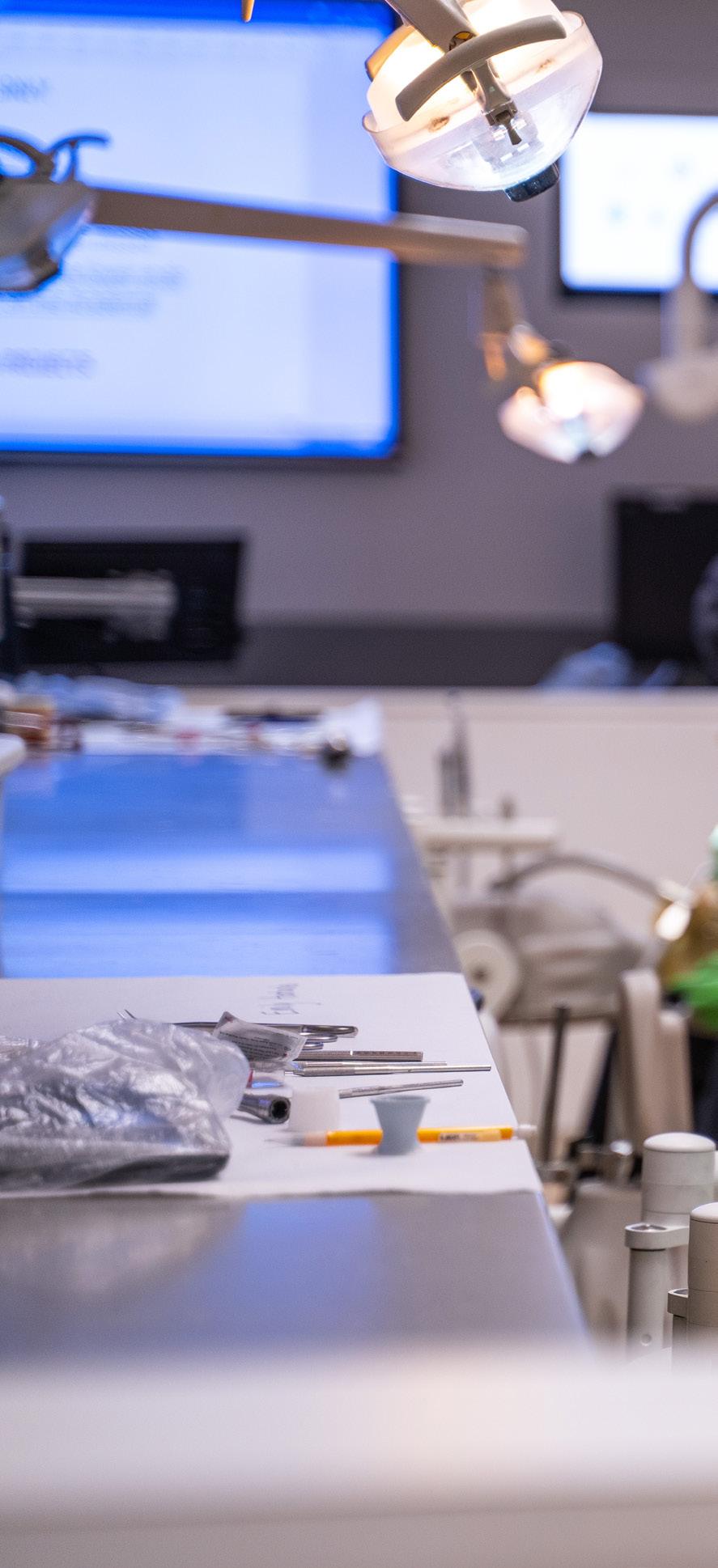
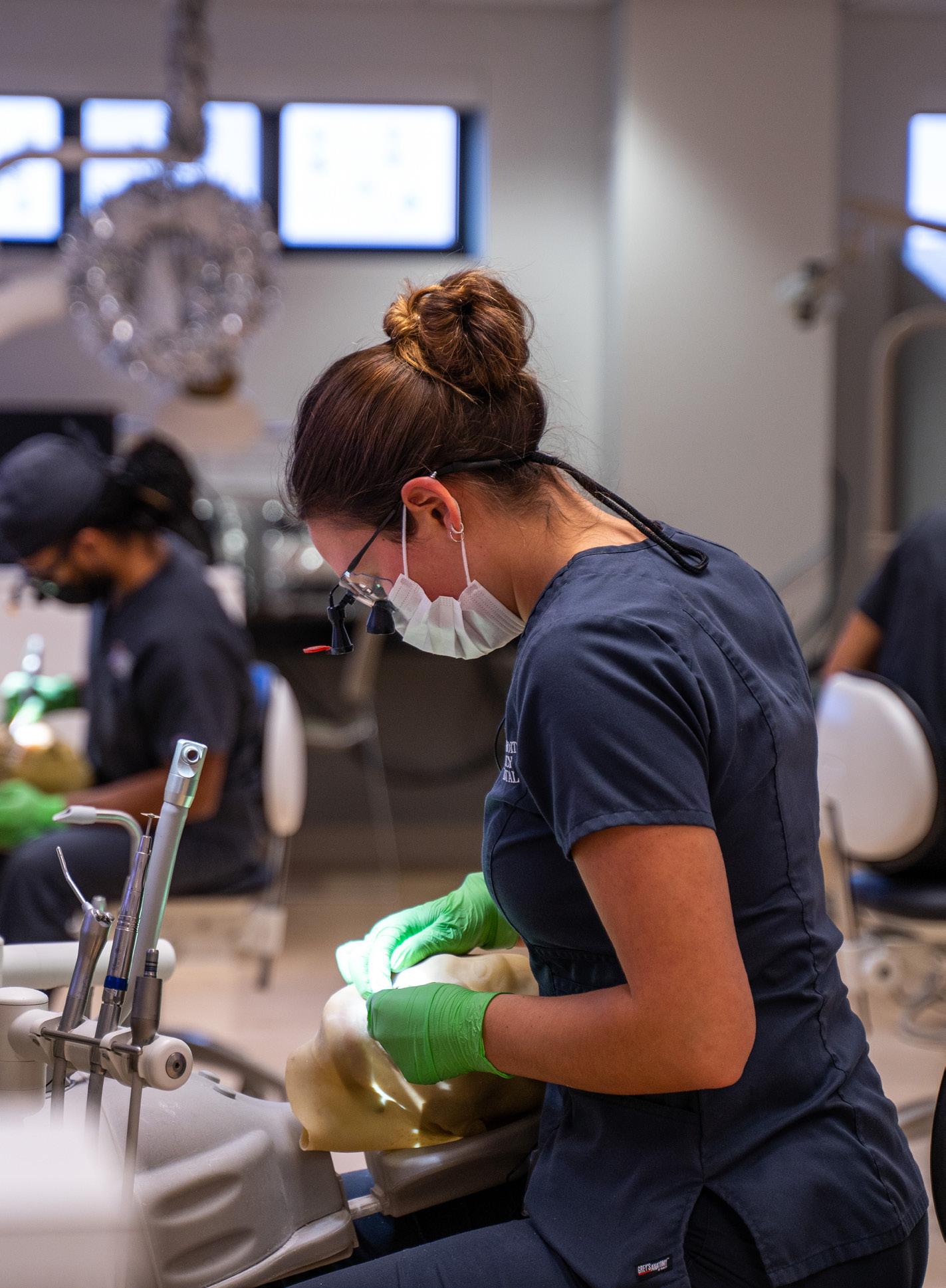
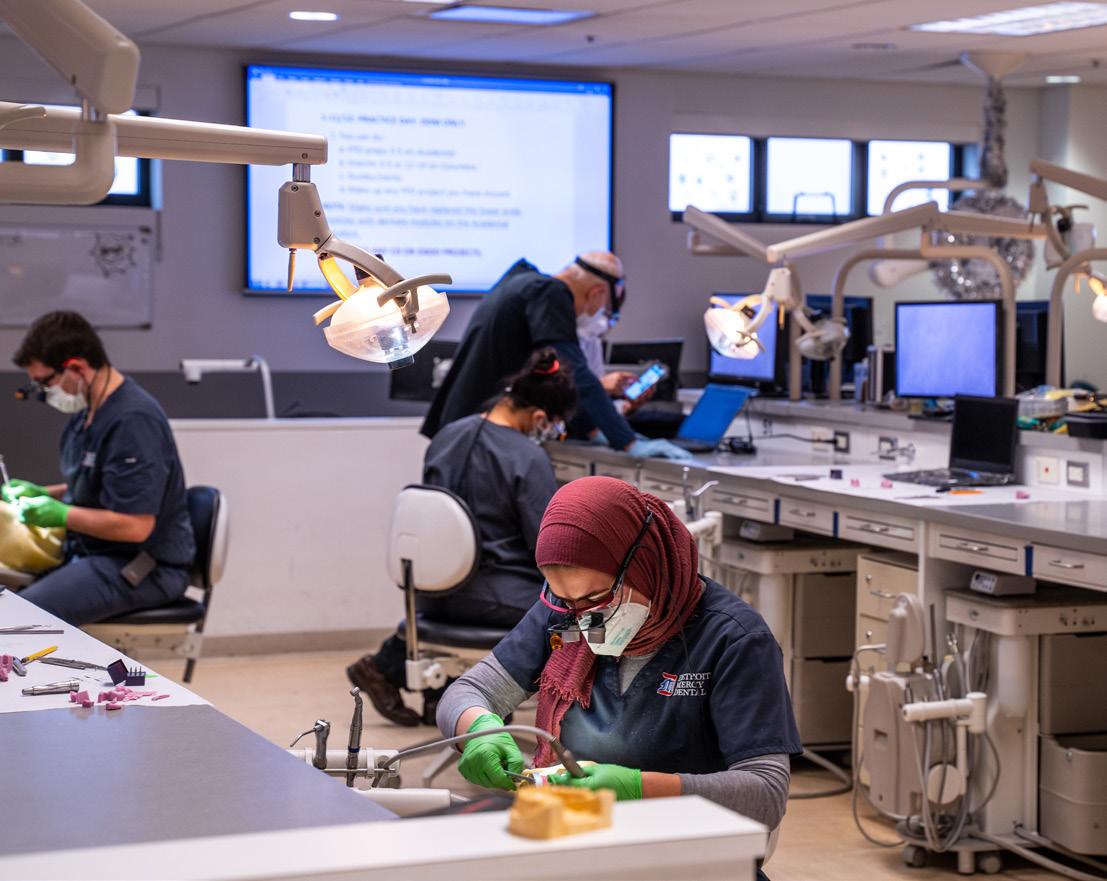
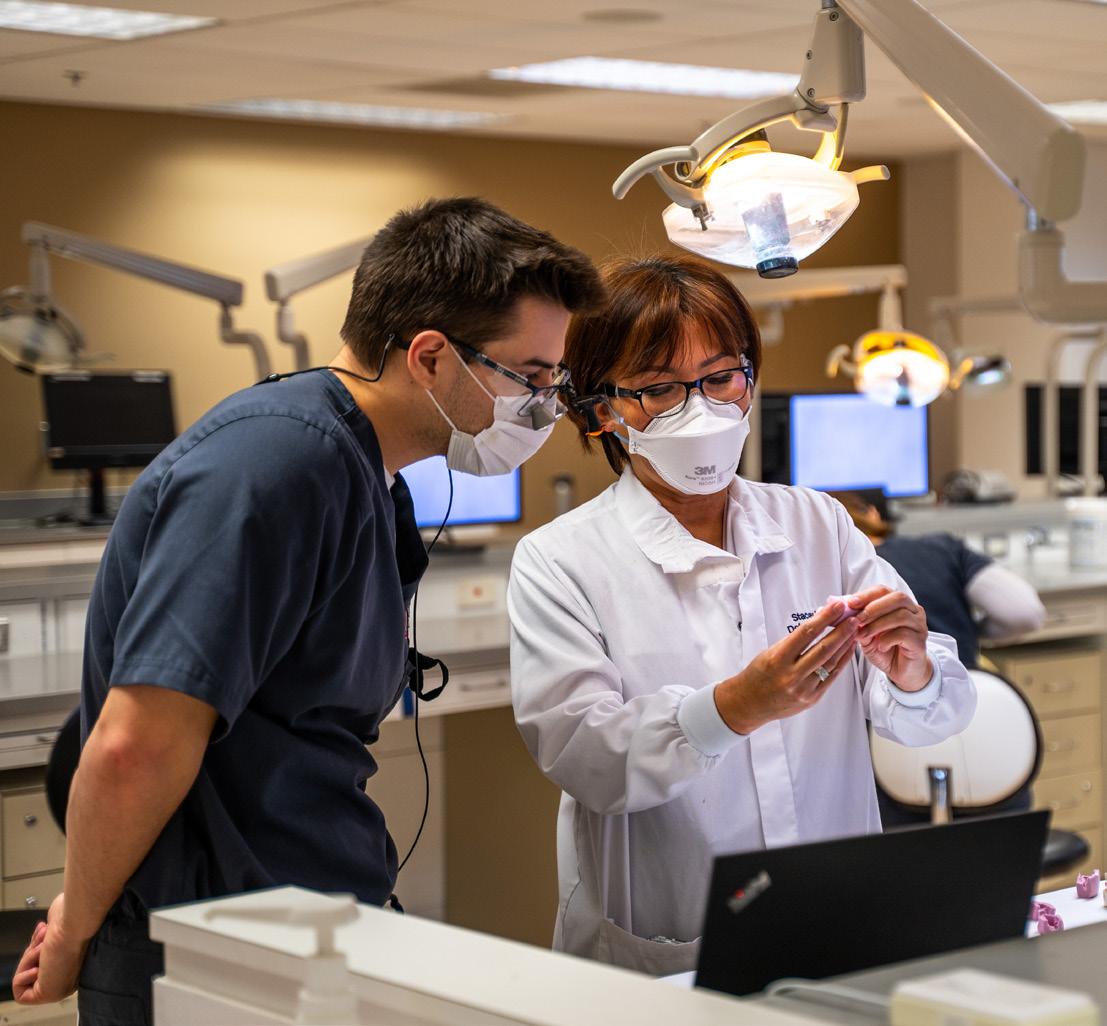
"I think we’re going to be more intentional and be able to use our resources in a more fiscally responsible way. I foresee a long-standing change that would allow future candidates the flexibility to choose if their interview will be virtual or in-person."
"The admission committee has provided us great feedback on the necessary changes; together we will evaluate the process and hone it for future classes.”
Q:. What long-term changes are now in place?
Daniels: “Long-term changes, and the discussions about long-term changes are long overdue. The pandemic created modifications to the program that are beneficial for both students and employees. "We are listening to what is important for today’s students and have become more learner centered. There will always be a need for virtual support services including tutoring, tele-health counseling, faculty/ staff office hours and one-on-one advising.”
Q: What is your outlook on the future?
Moreno: “We will continue to improve upon the components that create the student experience: strengthened communication, defined messages, intentional connections, institutional awareness, and personalized resources. We have made great strides in all of these areas, but have the opportunity to continue the upward trend.“
Daniels: “With respect to some student resources and services, we will continue to be flexible and nimble in addressing how we assist students. We have learned to support their educational experience using technology and services that can be delivered remotely. This allows us to support students more fully through a hybrid approach, offering on-site and remote student support services. Being physically present has new meaning. We have learned how remote learning and virtual educational support services can provide enhanced value and opportunities for our students to reach their educational goals.”
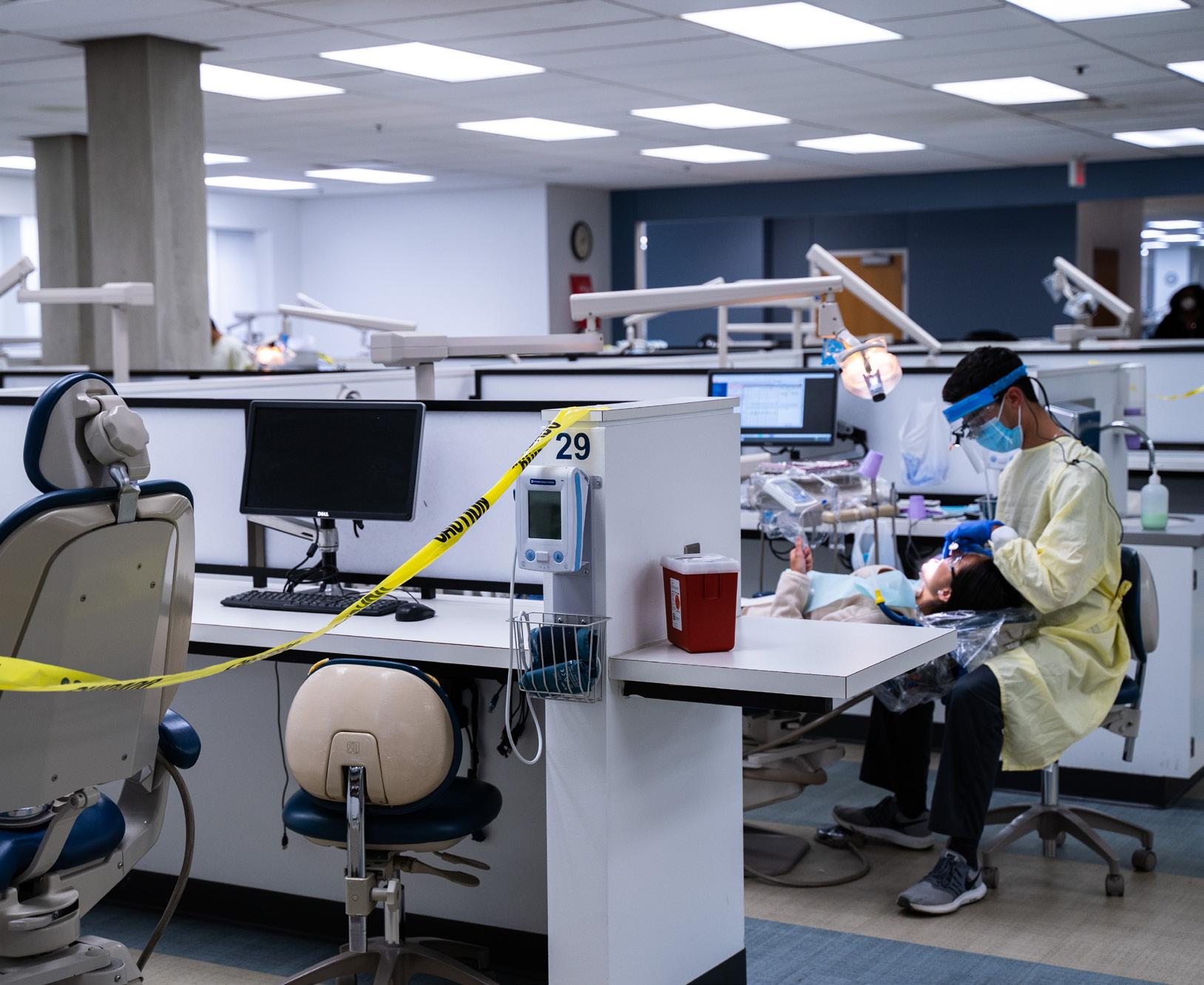
STUDENTS
Fourth-year dental student, Lucas Mathes will not deny that his final year has been met with some unique challenges, but he is resolved to push past the hardship and finish strong.
Pre-COVID, a fourth-year student was typically in clinic four and a half days a week and saw up to 18 patients a week. Now with longer days, staggered clinic shifts, and half-clinic capacity, a full schedule is eight patients per week. “Every minute in clinic is golden,” said Mathes.
Not only have students' clinical experiences changed, but their daily routine has been disrupted as they continue to adjust to virtual learning. Staying organized and depending on study groups have been some of the challenges Mathes admits to struggling with. “I find that I’m relying on my classmates and friends more than I ever have. Our most valuable resource is each other,” he said.
Although Mathes and his classmates have not been able to enjoy some of the typical experiences that come with being a fourth year, he remains cautiously optimistic. He feels that upon graduation, he will be ready for the next step in his professional dental career.
“When it comes to practice-readiness, I think Detroit Mercy Dental students are more practice-ready than any other dental students in the country,” Mathes said. “The things we do and experience is second to none.”
As understandable concerns of the future state of the economy are in the back of Mathes’ mind, he is still very much excited as he continues to apply to residencies and prepare for his final semester of dental school.

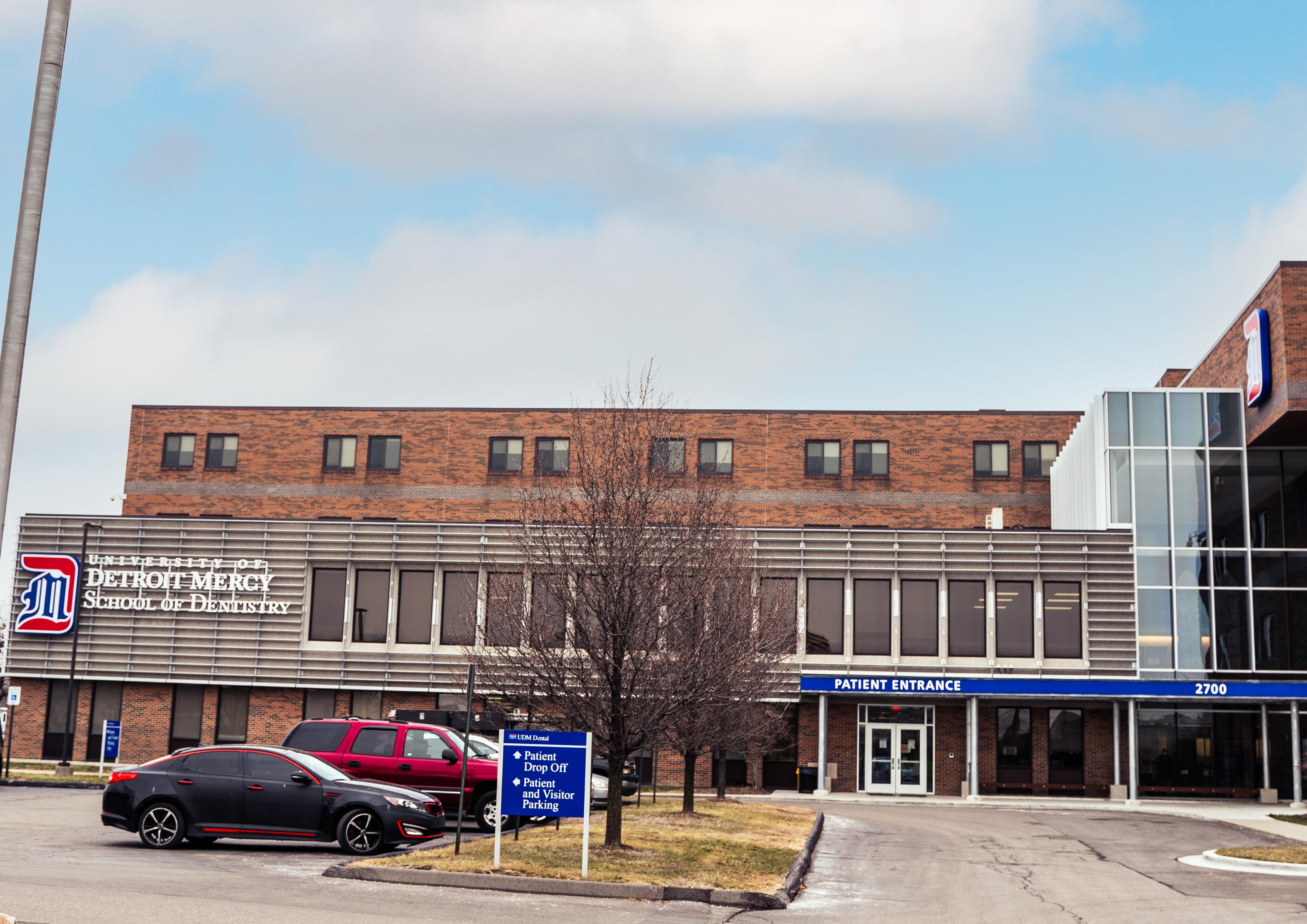
THE FUTURE OF DETROIT MERCY DENTAL
While we do not know what the future will hold, we do know that some of the changes born from COVID-19 have improved the student experience and are here to stay.
“It’s been a tough road, but Detroit Mercy Dental has reacted well, and their efforts are paying off,” Professor David Fischer said. “In a situation where there are not many perfect answers, everyone did an excellent job coming together to find reasonable solutions.”
The new normal of Detroit Mercy Dental today is one that was not planned, but through the challenges it is emerging a better institution for the future oral health professionals of tomorrow. COVID Relief Fund
If there is one thing the current crisis has made clear to all of us, it is that we are in this together. We are University of Detroit Mercy, a community that works together to deliver a quality education to our students. Whatever our particular role, we each are an integral part of the University family. Our mission calls us to be in solidarity with one another, especially in times of need.
The COVID-19 pandemic has had a profound impact, not only on our students, but on employees of the University as well. Our community has not been spared the realities of job loss, illness and the loss of loved ones and family members. Where emergency needs have always been a reality for members of our University community, they have become increasingly so in this trying time. As members of an institution that holds the values of cura personalis (care for the whole person) and cura apostolica (care for the work), we are being invited to care for one another as we continue to sustain the work of delivering a quality education for our students. Our current reality is pushing us to experience these values in tension, but we can only care for the work if we care for one another and ourselves.
To enable those who work at the University to support one another in times of crisis, the University has established the Employee Emergency Fund. To make a contribution, please visit: https://bit.ly/2XC38Gs



